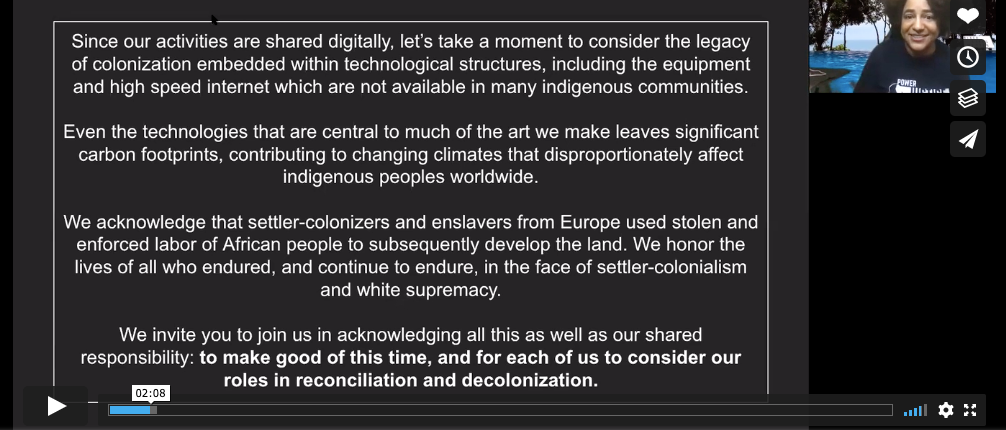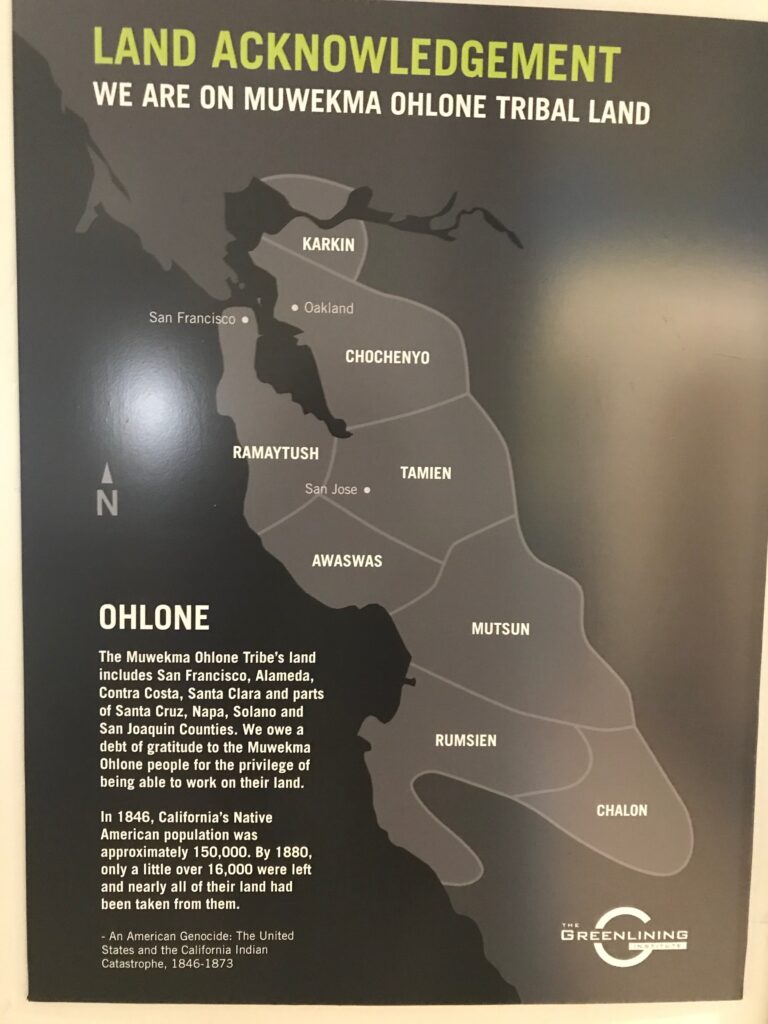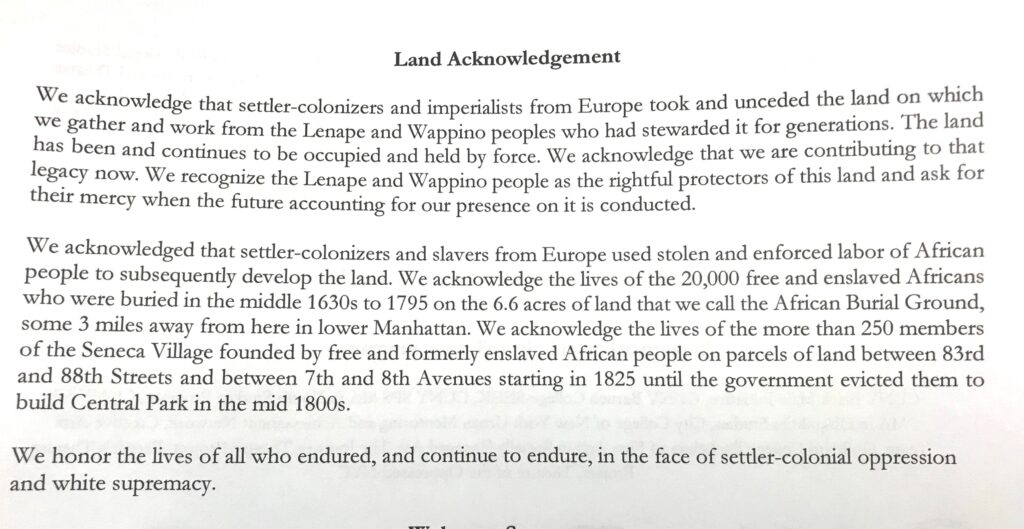The Calling Up Justice practice integrates decolonizing greetings for our in person and digital gatherings. This is a performance of creating access for those who feel alienated by the denial of colonization. It is important to interrupt normalized white domination. This practice is more traditionally called “Indigenous Land Acknowledgment” but we like to distance ourselves from the idea of nation and ownership and also open it up to include all populations negatively impacted by colonization and Supremacy Culture.

Opening Slide from The Ghostlight Project 2021 livestream
Reflections on Land Acknowledgment from producer Claudia Alick
“I first encountered the practices of The Land Acknowledgment when researching practices in Canada and Australia as I was prepping for a collaboration with Native community in Southern Oregon in the early 2000’s. I was specifically looking for best decolonized practices to open space and event especially when this was intertribal and I was unsure of protocols. At the time I did extensive research on other international practices, asked advice from my local tribes and wrote something original for us. Today there are many places online to find information and sample scripts. I think it’s always best practice to thoughtfully craft a unique opening to your events in this way. You can also have signage that is around all the time. Including land acknowledgment in email signatures is another way to include this performance in everyday exchanges. The best indigenous land acknowledgement the people are still alive. I think when done poorly the acknowledgment can become funereal. Today the Digital Land Acknowledgment is very important. Acknowledge your platform and the lands where they are headquartered. For example, we find it important to recognize that Zoom is headquartered in what is now called San Jose, CA which are the traditional lands of the Ohlone (OH -loan-ay) and Tamyen (tay-me-in) peoples. Most importantly including narratives of African enslavement are paramount in combatting anti-blackness and historical erasure. I have been attempting to script my decolonizing greetings with an aggressively intersectional lens and currently end with the spirit of Disability Justice cross movement solidarity. “
FIND WHO TO ACKNOWLEDGE: https://native-land.ca/

EXAMPLES and RESOURCES for Decolonized Greeting:
Example from Byron Au Yong: “I offer my care and gratitude to the land, water, and air, and support indigenous-led learning and teaching practices. As part of this online course, we will work together on these platforms: Instructure (the parent company of Canvas) headquartered in what is now called Salt Lake City, UT, which is on the traditional lands of the Eastern Shoshone and Goshute peoples. Google and Zoom headquartered in what is now called San Jose, CA, which are on the traditional lands of the Ohlone and Tamyen peoples. I respect the people of this land past and present, and acknowledge their continuing presence in their homelands and throughout their diasporas.”
Example from Leaping Water Consulting— http://www.leapingwater.org/2021/03/09/land-acknowledgement-portland/
This video from Unsettling Dramaturgy is a 3 hour praxis session on the practice in virtual spaces in remote collaboration: https://howlround.com/happenings/praxis-sessions-virtual-collaboration-land-acknowledgements
The US Department of Arts and Culture has published useful guides on the practice. They share that “IN COUNTRIES SUCH AS NEW ZEALAND, AUSTRALIA, CANADA, AND AMONG TRIBAL NATIONS IN THE U.S., it is commonplace, even policy, to open events and gatherings by acknowledging the traditional Indigenous inhabitants of that land. While some individuals and cultural and educational institutions in the United States have adopted this custom, the vast majority have not. “ https://usdac.us/nativeland
A Guide to indiginous land acknowdlgment https://nativegov.org/a-guide-to-indigenous-land-acknowledgment/
From Teen Vogue “Practicing acknowledgment can also raise awareness about histories that are often suppressed or forgotten. https://www.teenvogue.com/story/indigenous-land-acknowledgement-explained

This guide builds upon the important work that the Lenape Center, American Indian Community House, Rick Chavolla, Emily Johnson, the New Red Order (NRO) and the Native American and Indigenous Student Group (NAISG) at NYU have been doing with regard to land acknowledgements in Lenapehoking. http://landacknowledgements.org/
“It’s important for our audiences to grapple with the idea of the inherent right to land that First Peoples actually hold,” Nanibush says. “If it isn’t stated everywhere, all the time, people can continue to ignore its existence.” https://locallove.ca/issues/what-are-land-acknowledgements-and-why-do-they-matter/#.XdruqzJKjOQ
LANDBACK
LANDBACK is a movement that has existed for generations with a long legacy of organizing and sacrifice to get Indigenous Lands back into Indigenous hands. Currently, there are LANDBACK battles being fought all across Turtle Island, to the north and the South. NDN Collective, is stepping into this legacy with the launch of a LANDBACK Campaign as a mechanism to connect, coordinate, resource and amplify this movement and the communities that are fighting for LANDBACK. To truly dismantle white supremacy and systems of oppression, we have to go back to the roots. Which, for us, is putting Indigenous Lands back in Indigenous hands. LANDBACK is more than just a campaign. It is a political framework that allows us to deepen our relationships across the field of organizing movements working towards true collective liberation. It allows us to envision a world where Black, Indigenous & POC liberation co-exists. It is our political, organizing and narrative framework from which we do the work. Go to LandBack.org
#decolonization #indigenousjustice #land #landacknowledgment #racialjustice #understanding #vocabulary #resource

